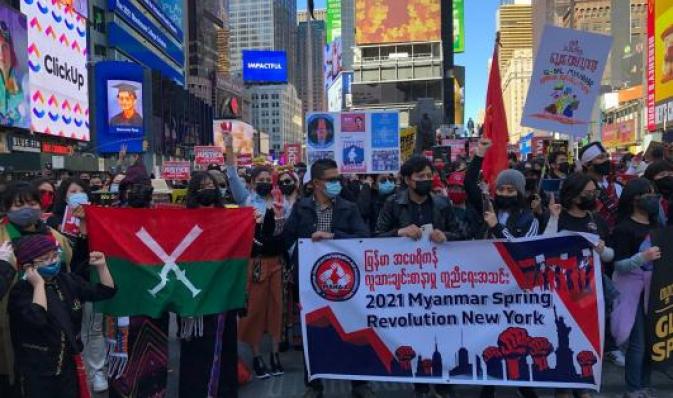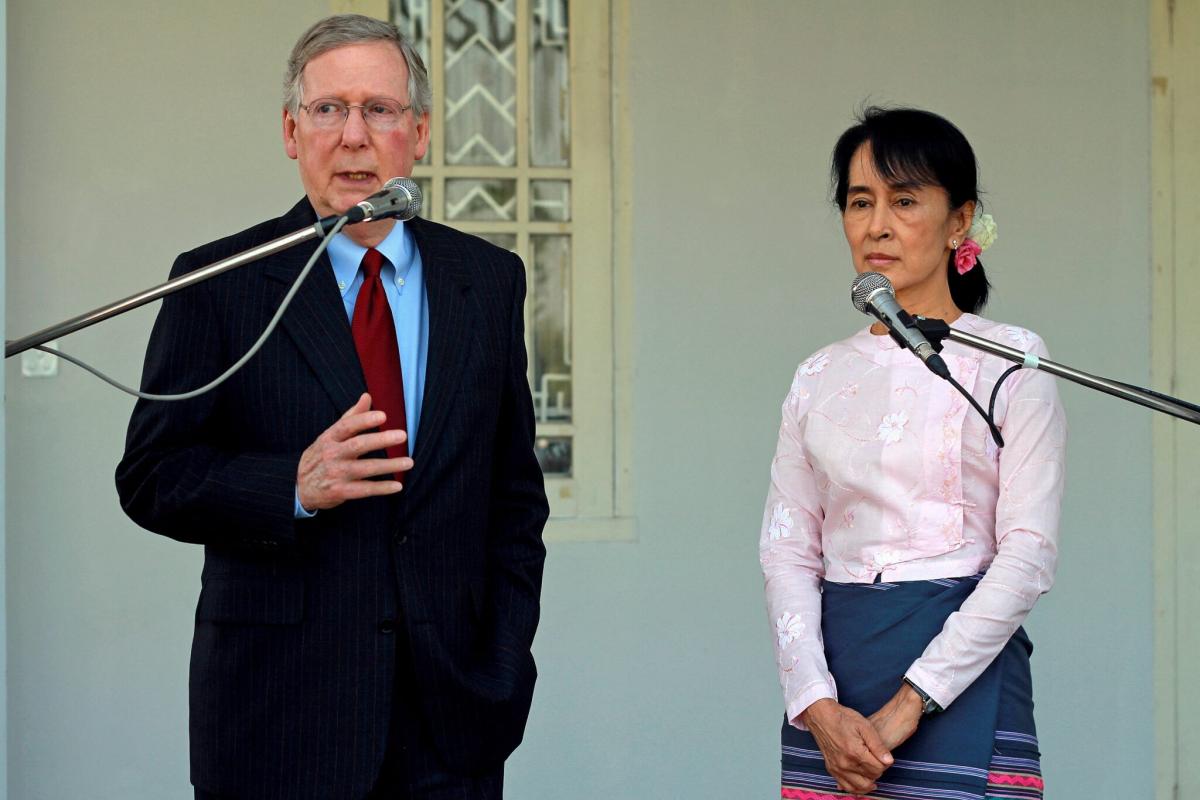
Few people understood grassroots organising better than the Free Burma Coalition. Led by a young and charismatic Maung Zarni, they spent much of the 1990s weaving together the human rights and anti-corporate movements to block US sourcing from Myanmar. College campuses and major cities around the US hosted Free Burma Coalition chapters where young professionals found common cause in the movement. “When spiders unite, they can tie down a lion,” was the slogan they adopted from an Ethiopian proverb. When their efforts led to PepsiCo divesting from the country, Maung Zarni’s photo appeared on the front page of USA Today.
By MIKE HAACK | FRONTIER | JANUARY 13, 2023
The act passed not due to an old guard tainted by anti-Rohingya prejudice, but thanks to a new coalition of ethnic minorities and youth, who made strategic alliances with US institutions and told the right story.
Many US-Myanmar policy experts thought the BURMA Act couldn’t pass.
An earlier version of the bill, introduced before the 2021 coup, had stalled despite broad support, including 394 yes votes to only 21 nays in the US House of Representatives. The 2019 bill would have also probably breezed through the Senate, if it weren’t for the intervention of then-Senate Majority Leader Mitch McConnell.
McConnell has been at the forefront of Myanmar legislation for two decades and the 2019 bill had many of the markings of bills he had previously authored. It sought to decrease the strength of the Tatmadaw through targeted sanctions and provide humanitarian aid for its victims. However, the bill was also meant to address the Rohingya crisis and McConnell worried about the implications for his “old friend”, then-State Counsellor Daw Aung San Suu Kyi and her fragile power-sharing arrangement with the military. Without the leader’s blessing, Republicans would not move it out of committee, and it died without a floor vote.
In October 2021, when an updated bill was introduced to address the post-coup reality, the same dynamics seemed to be playing out. This time, support in the House was even stronger, with the legislation passing unanimously. But it was again held up in the Senate by Republicans who were waiting for McConnell’s approval. For those not familiar with the US political system, Senate Republicans rely on McConnell to push their legislative agenda and going against him could be politically damaging. Liberating the BURMA Act from limbo would therefore not be easy.
In Washington, foundations and think tanks support around a baker’s dozen Myanmar experts. Add to that about a half dozen activist-spokespeople and what you have is a machine capable of winning small adjustments to policy, but which is not powerful enough to force large changes. Ideas without constituencies carry little weight in Washington. Short of heading a major corporation, to effect national policy one must venture into the decidedly unprestigious world of organising regular Americans. Two decades ago, the movement for democracy in Burma had this mastered.
Few people understood grassroots organising better than the Free Burma Coalition. Led by a young and charismatic Maung Zarni, they spent much of the 1990s weaving together the human rights and anti-corporate movements to block US sourcing from Myanmar. College campuses and major cities around the US hosted Free Burma Coalition chapters where young professionals found common cause in the movement. “When spiders unite, they can tie down a lion,” was the slogan they adopted from an Ethiopian proverb. When their efforts led to PepsiCo divesting from the country, Maung Zarni’s photo appeared on the front page of USA Today.
In 2003, the Bush administration placed an import ban on Burma, causing activists to search for new targets. Around the same time, Maung Zarni returned to Burma in an attempt to engage in Track II diplomacy. Though the movement continued, it never again reached the fever pitch of the late 1990s.
Getting ordinary Americans to care is hard. In 2007, Hollywood A-lister Jim Carey stood in front of a camera and explained how to pronounce Aung San Suu Kyi’s name. “Aung San sounds like ‘unsung’ as in ‘unsung hero’,’’ he said. It was part of a series released by the Human Rights Action Center and US Campaign for Burma, in which celebrities helped frame the discourse around Aung San Suu Kyi. But it was a tower built on sand.
In 2019, when Aung San Suu Kyi sat in front of the International Court of Justice and eschewed universal values in defense of sovereignty and defended the military from accusations of genocide, many of those who worked for decades to make her an international icon were left feeling betrayed.
But Aung San Suu Kyi’s ethnonationalism had always been there. As historian Thant Myint-U points out in The Hidden History of Burma, Aung San Suu Kyi’s academic essays portray Chinese and South Asians as unwelcome immigrants brought by colonialism to take advantage of the Burmese. With her postcolonial nativism fully exposed by the Rohingya crisis, the democracy movement that is associated with her is harder to sell. When Me Me Khant and I approached representatives of the celebrities who made the original advocacy videos to do something for Burma in wake of the coup, nobody would touch it. What was once an image boost, is now a liability.
The deadlock in Congress also reflected this shift. McConnell continues to see Aung San Suu Kyi as Burma’s singular beacon of hope, while the vast majority of senators and representatives have joined other informed Americans in seeing ethnonationalism as at the core of Myanmar’s problems. To move things through Congress, one must therefore get past the impasse caused by these competing narratives.

The foreign policy staff in Congress are responsible for keeping track of events in some 200 countries. With something as low priority as foreign policy on Myanmar, there is little time or patience for nuance and complexity; any muddying of the narrative means very little gets done. Observing this, some have encouraged the NUG to prioritise ethnic issues.
Though the NUG is unquestionably more supportive of ethnic minority rights than their predecessors, the challenge for the NUG is that their major financial backers in the diaspora are those who feel the most aggrieved by the world’s criticism of the NLD’s handling of the Rohingya crisis.
Nationalism and nativism make for a powerful fundraising pitch, and tens of millions of no-strings-attached dollars from the diaspora are helping to keep the revolution in Burma alive while various US agencies hem and haw. Caught between opposing constituencies, confused signals have resulted. Despite these challenges, the NUG deserves credit for recent improvements in their messaging and overall strategy in the West, including their statement on the BURMA Act’s passage.
When the Act was introduced in October of 2021 the first surprise was the absence of Indiana Senator Todd Young. Inspired by anti-genocide activists in Indianapolis and the large Chin community in his state, Young had led the Republican cosponsors on the 2019 bill. His office had worked hard to gain McConnell’s approval, to no avail, and after five months of waiting, the Democratic co-sponsor Senator Ben Cardin got tired of waiting and moved forward without Young. Subsequent bad blood between the two senators contributed to the deadlock, as no Republicans wanted to go over Young’s head.
While the politicians argued, coalitions formed across all 50 states. On August 7, 2021, several thousand members of the diaspora gathered in Washington for the Save Myanmar March, urging the passage of the BURMA Act, among other demands. But the movement became less united after the Act was introduced. While sanctions and humanitarian aid kept most groups in the coalition, around November 2021, some more nationalist groups began attacking the bill for centering the Rohingya and not offering diplomatic recognition to the NUG.
A massive lobbying campaign commenced. The US Advocacy Coalition for Myanmar, a group of Millennial and Gen Z people from Myanmar, Myanmar-Americans, and their American friends of various backgrounds, of which I am one, brought constituents to meetings with 70 Senate offices, covering nearly every state, and built relationships with the House Foreign Affairs Committee. As the months went by, our tactics became more sophisticated, including holding a happy hour attended by scores of congressional staffers.
But the most influential institutions were religiously oriented. There are about 300,000 people of Myanmar descent living in the US, the vast majority of which are Christian and belong to denominations that have strong pull in Congress. Chin Baptists were particularly dedicated to lobbying for the Act via the Burma Advocacy Group, including by airing explanatory videos in Chin churches across the country. Nationalist voices were drowned out, too far out of touch with the mainstream American understanding of events in Burma to get much currency.
A major turning point came in March last year, when the State Department declared that the violence against the Rohingya constituted a genocide. With the BURMA Act’s major Rohingya related “ask” fulfilled, it could be removed from the bill, opening the door for McConnell to approve it. But more compromises were needed to get the Senate Republicans on board, some of which partially defanged the bill. The recommended increases in authorised spending were removed, sanctions against Myanma Oil and Gas Enterprise were downgraded in priority, an exemption allowing Chevron to continue operating in Myanmar was added, and the last references to the Rohingya were removed.
Despite these shortcomings, the 25-page version of the BURMA Act, which passed as part of the 2023 National Defense Authorization Act, is by far the most robust action the US Congress has taken on Myanmar in 15, arguably 19, years. This time, power lies with a new, more open and diverse coalition.
Mike Haack has been involved in Myanmar-related advocacy in various capacities since first visiting the country in 2002, including serving as the campaigns coordinator for US Campaign for Burma from 2008-2010. Since the 2021 coup, he has been working with the Campaign for New Myanmar and U.S. Advocacy Coalition for Myanmar to pass the BURMA Act.
A previous version of this article incorrectly stated that Maung Zarni returned to Myanmar to negotiate with Khin Nyunt, of the previous junta. Khin Nyunt had been jailed prior to Maung Zarni’s return. Frontier apologises for the error.









